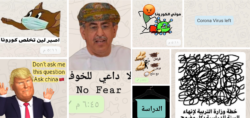Covid-19 WhatsApp Stickers as Public Signs in Oman
- Date
- Friday 14 May 2021, 12:00 - 13:30 GMT
- Location
- online
- Category
- Multimodality
Join us for our next session in the Multimodality Talks Series:
When: 14th May 2021 12.00-1.30pm GMT Time
Where: Register for the event at https://www.eventbrite.co.uk/e/najma-al-zidjali-covid-19-whatsapp-stickers-as-public-signs-in-oman-tickets-132315885375 and you’ll receive a link to attend the talk
Covid-19 WhatsApp Stickers as Public Signs in Oman
Dr Najma Al Zidjaly, Sultan Qaboos University, Oman
Abstract:
In this paper, I theorize WhatsApp stickers (elaborate character-driven emoticons) that the public in Oman has created and shared nationally on WhatsApp during the Covid-19 pandemic as public signs that simultaneously function as: i) carriers of information and ii) critique of the public discourse of the government in Oman. To arrive at the use, form and function of the created WhatsApp stickers, and their appropriation as public signs, I draw and integrate the following analytical methods: I appropriate a geosemiotic approach to public signs created by Scollon and Scollon (2003) that situates any form of public sign linguistically, socially, culturally, and, in the case of my data, globally. I also draw upon relational approaches to impolite-oriented discourse (Locher and Bolander 2017) and integrate it with research on Arabic cultural practices of lamenting (Al Zidjaly 2017) and “those who shall remain nameless” (Al Zidjaly et al. 2020).
The data are taken from a larger project on “Arabs through the Lens of Coronavirus” that I started in Spring 2020. The data set consists of public signs, discourses and a set of over 300 memes, gifs, WhatsApp stickers created and shared nationally by citizens in Oman, an Arabian Islamic social monarchy, to publicize and react to government discourse on Covid-19. Five functions of Omani coronavirus WhatsApp stickers are identified: ridicule the government of Oman, support the government of Oman, educate the public, index frustration, and express levity. The findings suggest that in creating and using WhatsApp stickers Omanis positioned themselves as agentive participants in charge of their own lives, sending an indirect request for a new form of government relation where: i) the government works for the public, ii) the public is equal to the government, and iii) the government officials are held responsible for their failures. The research contributes to digital discourse by examining new forms of public signs created by citizens in an understudied Arabic context during the Covid-19 pandemic.
References
- Al Zidjaly, N. (2017). Memes as reasonably hostile laments: A discourse analysis of political dissent in Oman. Discourse & Society, 28(6), 573–594.
- Al Zidjaly, N. Al-Moqbali, E. & Al Hinai, A. (2020). Food, activism, and Chips Oman on Twitter. In A. Tovares and C. Gordon, Identity and ideology in digital food discourse: Social media interactions across cultural contexts(pp. 197-224). Washington, DC: Bloomsbury Press.
- Locher, M. A. & Bolander, B. (2017). Facework and identity. In C.R. Hoffman and W. Bublitz (Eds.). Pragmatics of social media, 407—434. Berlin: De Gruyter Mouton.
- Scollon and Scollon. (2003). Discourse in Public: Geosemiotics. London: Routledge.
Biosketch
Najma Al Zidjaly is Associate Professor of Social Media and Arab Identity in the Department of English Language and Literature (College of Arts & Social Sciences) at Sultan Qaboos University (Oman). She is the author of Disability, Discourse and Technology: Agency and Inclusion in (Inter)action (2015-Palgrave Macmillan) and the Editor of the Special Issue on Society in Digital Contexts: New Modes of Identity and Community Construction (2019-Multilingua). Al Zidjaly has additionally published articles in scholarly high impact journals such as Language in Society; Discourse & Society; Discourse, Context & Media; Visual Communication; Communication & Medicine; Multimodal Communication; Russian Journal of Linguistics and Multilingua. Al Zidjaly serves on the directorial board of the Journal of Multimodal Communication and is Associate Editor (for the Arab World) of the IPrA Bibliography of Pragmatics Online.
The Multimodality Talks Series is organised by the University of Leeds Multimodality@Leeds, The UCL Visual and Multimodal Research Forum, and Insulander/Svärdemo Åberg at the Department of Education, Stockholm University. It is conceived of working as a tandem with the Bremen-Groningen Online Workshops on Multimodality to make the best of the online format to offer multiple chances for sharing research and stimulating discussions on multimodality worldwide. See the full Multimodality Talk Series programme here: https://mmodalityleeds.wordpress.com/2020/12/11/programmes-multimodality-talks-series/

